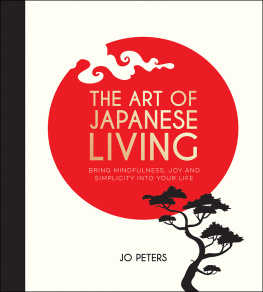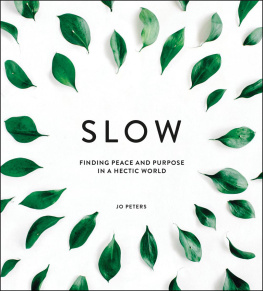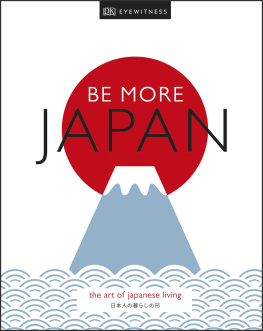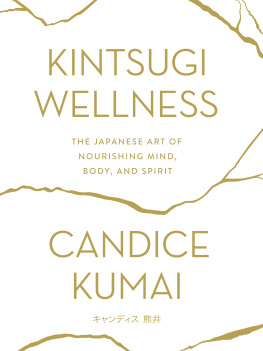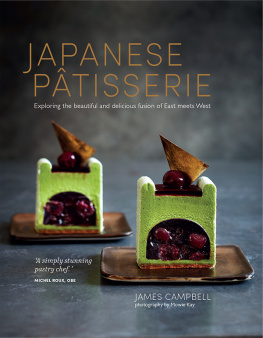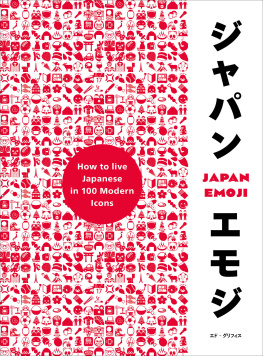Jo Peters - The Art of Japanese Living
Here you can read online Jo Peters - The Art of Japanese Living full text of the book (entire story) in english for free. Download pdf and epub, get meaning, cover and reviews about this ebook. year: 2019, publisher: Summersdale Publishers Ltd, genre: Home and family. Description of the work, (preface) as well as reviews are available. Best literature library LitArk.com created for fans of good reading and offers a wide selection of genres:
Romance novel
Science fiction
Adventure
Detective
Science
History
Home and family
Prose
Art
Politics
Computer
Non-fiction
Religion
Business
Children
Humor
Choose a favorite category and find really read worthwhile books. Enjoy immersion in the world of imagination, feel the emotions of the characters or learn something new for yourself, make an fascinating discovery.
- Book:The Art of Japanese Living
- Author:
- Publisher:Summersdale Publishers Ltd
- Genre:
- Year:2019
- Rating:3 / 5
- Favourites:Add to favourites
- Your mark:
- 60
- 1
- 2
- 3
- 4
- 5
The Art of Japanese Living: summary, description and annotation
We offer to read an annotation, description, summary or preface (depends on what the author of the book "The Art of Japanese Living" wrote himself). If you haven't found the necessary information about the book — write in the comments, we will try to find it.
The Art of Japanese Living — read online for free the complete book (whole text) full work
Below is the text of the book, divided by pages. System saving the place of the last page read, allows you to conveniently read the book "The Art of Japanese Living" online for free, without having to search again every time where you left off. Put a bookmark, and you can go to the page where you finished reading at any time.
Font size:
Interval:
Bookmark:


THE ART OF JAPANESE LIVING
Copyright Summersdale Publishers Ltd, 2019
All rights reserved.
Text by Claire Berrisford
No part of this book may be reproduced by any means, nor transmitted, nor translated into a machine language, without the written permission of the publishers.
Condition of Sale
This book is sold subject to the condition that it shall not, by way of trade or otherwise, be lent, resold, hired out or otherwise circulated in any form of binding or cover other than that in which it is published and without a similar condition including this condition being imposed on the subsequent purchaser.
An Hachette UK Company
www.hachette.co.uk
Summersdale Publishers Ltd
Part of Octopus Publishing Group Limited
Carmelite House
50 Victoria Embankment
LONDON
EC4Y 0DZ
UK
www.summersdale.com
eISBN: 978-1-78783-466-8
Substantial discounts on bulk quantities of Summersdale books are available to corporations, professional associations and other organizations. For details contact general enquiries: telephone: +44 (0) 1243 771107 or email: .

INTRODUCTION
Japanese culture is known for its sincere and thoughtful approach to life. From small day-to-day routines to ancient traditions such as the tea ceremony, the Japanese way of living shows us that in every corner of the day there is room for a moment of mindfulness.
In a world thats constantly speeding up, there is much we can learn from the Japanese attitude to life. With its roots in Buddhist thinking, the culture has a lot to say about the positive power of gratitude; about the vital connection between nature and our well-being; and about the value of a calm and considered approach to the everyday.
You can find all these things and more inside this beautiful volume. Take a step into the meditative arts of bonsai , ikebana and origami, or try your hand at cooking some delicious Japanese dishes. Rediscover the restorative wonders of a hot bath, be inspired by the philosophy of the tea ceremony, or bring stillness to your heart with forest bathing. See the world through a new lens with wabi sabi , or discover value and beauty in imperfection with kintsugi .
Within these pages lie the secrets to everyday contentment and the key to living a rich, joyful and thoughtful life. There are many ways that we can be inspired by Japanese culture to find peace and happiness, and this book will show you how.

Ikigai
Finding what gives you a meaningful life
YOUR IKIGAI
We all want a sense of purpose in our lives something that makes us happy and makes our lives feel full; something that spurs us on to get out of bed in the morning. The Japanese have a word for this feeling of purpose: ikigai , which translates roughly as a reason for living. Its a core belief or feeling that characterizes who you are and whats most important to you, and many believe that finding and defining your ikigai the thing that makes you tick is the key to feeling fulfilled and happy.
Your ikigai is a current that runs through your whole life. However, although it sounds grand, the actions you take to pursue it often play out on the small-scale your ikigai will inform the simple transactions of day-today life. For instance, if your ikigai was to help other people, holding the door open for someone could be a small everyday way of pursuing what makes you feel happiest.
Your ikigai will be unique to you, because we all find happiness in different ways. You may find it through your work, or through a hobby. Your ikigai could be providing and caring for your family, or you could find it through creating beauty, by making laughter, or by spreading peace. You may even find that your ikigai changes as you go through life, because what brings you joy at 25 may be different to what fulfils you at 65.
Finding your ikigai is not something that happens overnight. Being able to boil your lifes purpose down to one sentence requires self-reflection and insight, and it means being completely in tune with yourself. Even if you have an approximate sense of what your ikigai might be, it can take years before you reach a conclusion.
You probably have a good idea of what you like and dont like doing, but your ikigai runs deeper than having a passion for something. For instance, you may be a keen gardener, but ask yourself why you love gardening. Why does it bring you joy and satisfaction? Is it because you like seeing the continual progress of the plants that you tend to? Is it because you want to cultivate beautiful things? Is it because you like to create order and structure? Once you have answered this question, think about it in terms of your life as a whole. Do you enjoy finding beauty, structure or progress in other areas of your life too? Once you start looking, it is likely that you will start to see patterns in your answers. This is the start of finding your ikigai .


WHAT IT IS AND WHAT IT ISNT
Primarily, your ikigai should be something that brings you joy and leaves you feeling fulfilled rather than drained. Even if your ikigai is related to making others happy, it should also make you happy; it wont be something you do out of a sense of obligation.
Your ikigai will usually help you connect to the people around you, as its often about what you can give to the world rather than what you can take. For instance, a writers work will be read and discussed, an artists work will be viewed and a volunteers time will help another person. An ikigai will also be active not passive. Its something that you deliberately pursue for the specific purpose of bringing you joy, even if its as simple as going for a walk, reading a book or talking to a friend.
Your ikigai is often related to things you can see growing and developing, whether youre working on a project, improving a skill or watching a child growing up. This is also why an ikigai will not be a specific goal. Your ikigai is a defining part of your self that will always be with you, so there is no finish line. However, it doesnt mean that your ikigai cant help you achieve your dreams. For instance, your ikigai would not be to publish a novel, but it could be sharing stories and connecting with others. In that case, publishing a novel might be something you do in the course of pursuing your purpose.

THE GIFTS OF IKIGAI
So why bother identifying your ikigai ? It takes so much time and effort why not just carry on through life doing the things you like to do and avoiding the things you dont? Because having a concrete grasp on what makes you you a definite sentence that defines who you are and what your purpose is is empowering.
Knowing your ikigai means that you have a deep understanding of yourself and what makes you feel your best. It means you know how to find happiness. It also gives you a sense of control, it helps you direct your life and it enables you to pinpoint what motivates you.
Font size:
Interval:
Bookmark:
Similar books «The Art of Japanese Living»
Look at similar books to The Art of Japanese Living. We have selected literature similar in name and meaning in the hope of providing readers with more options to find new, interesting, not yet read works.
Discussion, reviews of the book The Art of Japanese Living and just readers' own opinions. Leave your comments, write what you think about the work, its meaning or the main characters. Specify what exactly you liked and what you didn't like, and why you think so.

